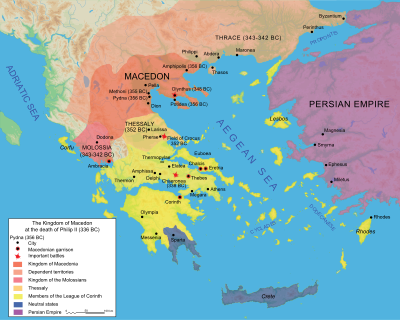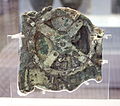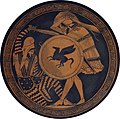
Back بوابة:اليونان القديمة Arabic Portal:Qədim Yunanıstan Azerbaijani Партал:Старажытная Грэцыя Byelorussian Portal:Griechische Antike German Πύλη:Αρχαία Ελλάδα Greek Portal:Antigua Grecia Spanish Portail:Grèce antique French Portal:Grecia antiga Galician פורטל:יוון העתיקה HE Պորտալ:Հին Հունաստան Armenian
The Ancient Greece Portal

Ancient Greece (Greek: Ἑλλάς, romanized: Hellás) was a northeastern Mediterranean civilization, existing from the Greek Dark Ages of the 12th–9th centuries BC to the end of classical antiquity (c. 600 AD), that comprised a loose collection of culturally and linguistically related city-states and other territories. Most of these regions were officially unified only once, for 13 years, under Alexander the Great's empire from 336 to 323 BC. In Western history, the era of classical antiquity was immediately followed by the Early Middle Ages and the Byzantine period.
Three centuries after the Late Bronze Age collapse of Mycenaean Greece, Greek urban poleis began to form in the 8th century BC, ushering in the Archaic period and the colonization of the Mediterranean Basin. This was followed by the age of Classical Greece, from the Greco-Persian Wars to the 5th to 4th centuries BC, and which included the Golden Age of Athens. The conquests of Alexander the Great spread Hellenistic civilization from the western Mediterranean to Central Asia. The Hellenistic period ended with the conquest of the eastern Mediterranean world by the Roman Republic, and the annexation of the Roman province of Macedonia in Roman Greece, and later the province of Achaea during the Roman Empire.
Classical Greek culture, especially philosophy, had a powerful influence on ancient Rome, which carried a version of it throughout the Mediterranean and much of Europe. For this reason, Classical Greece is generally considered the cradle of Western civilization, the seminal culture from which the modern West derives many of its founding archetypes and ideas in politics, philosophy, science, and art. (Full article...)
Selected article -

The kingdom of Macedonia was an ancient state in what is now the Macedonian region of northern Greece, founded in the mid-7th century BC during the period of Archaic Greece and lasting until the mid-2nd century BC. Led first by the Argead dynasty of kings, Macedonia became a vassal state of the Achaemenid Empire of ancient Persia during the reigns of Amyntas I of Macedon (r. 547 – 498 BC) and his son Alexander I of Macedon (r. 498 – 454 BC). The period of Achaemenid Macedonia came to an end in roughly 479 BC with the ultimate Greek victory against the second Persian invasion of Greece led by Xerxes I and the withdrawal of Persian forces from the European mainland.
During the age of Classical Greece, Perdiccas II of Macedon (r. 454 – 413 BC) became directly involved in the Peloponnesian War (431–404 BC) between Classical Athens and Sparta, shifting his alliance from one city-state to another while attempting to retain Macedonian control over the Chalcidice peninsula. His reign was also marked by conflict and temporary alliances with the Thracian ruler Sitalces of the Odrysian Kingdom. He eventually made peace with Athens, thus forming an alliance between the two that carried over into the reign of Archelaus I of Macedon (r. 413 – 399 BC). His reign brought peace, stability, and financial security to the Macedonian realm, yet his little-understood assassination (perhaps by a royal page) left the kingdom in peril and conflict. The turbulent reign of Amyntas III of Macedon (r. 393 – 370 BC) witnessed devastating invasions by both the Illyrian ruler Bardylis of the Dardani and the Chalcidian city-state of Olynthos, both of which were defeated with the aid of foreign powers, the city-states of Thessaly and Sparta, respectively. Alexander II (r. 370 – 368 BC) invaded Thessaly but failed to hold Larissa, which was captured by Pelopidas of Thebes, who made peace with Macedonia on condition that they surrender noble hostages, including the future king Philip II of Macedon (r. 359 – 336 BC). (Full article...)Selected location -
Magnesia or Magnesia on the Maeander (Ancient Greek: Μαγνησία ἡ πρὸς Μαιάνδρῳ or Μαγνησία ἡ ἐπὶ Μαιάνδρῳ; Latin: Magnesia ad Maeandrum) was an ancient Greek city in Ionia, considerable in size, at an important location commercially and strategically in the triangle of Priene, Ephesus and Tralles. The city was named Magnesia, after the Magnetes from Thessaly who settled the area along with some Cretans. It was later called "on the Meander" to distinguish it from the nearby Lydian city Magnesia ad Sipylum. It was earlier the site of Leucophrys mentioned by several ancient writers.
The territory around Magnesia was extremely fertile, and produced excellent wine, figs, and cucumbers. It was built on the slope of Mount Thorax, on the banks of the small river Lethacus, a tributary of the Maeander river upstream from Ephesus. It was 15 miles from the city of Miletus. The ruins of the city are located west of the modern village Tekin in the Germencik district of Aydın Province, Turkey. (Full article...)Did you know...
- ... that the Greeks did not have a term for "religion"?
- ... that Ancient Greek cuisine was characterized by its frugality, reflecting agricultural hardship?
- ... that the economy of ancient Greece was characterized by the extreme importance of agriculture, all the more so because of the relative poverty of Greece's soil?
Related portals
Selected biography -
Alcibiades (/ˌælsɪˈbaɪ.ədiːz/ AL-sib-EYE-ə-deez; Greek: Ἀλκιβιάδης; c. 450 – 404 BC) was an Athenian statesman and general. The last of the Alcmaeonidae, he played a major role in the second half of the Peloponnesian War as a strategic advisor, military commander, and politician, but subsequently fell from prominence.
During the course of the Peloponnesian War, Alcibiades changed his political allegiance several times. In his native Athens in the early 410s BC, he advocated an aggressive foreign policy and was a prominent proponent of the Sicilian Expedition. After his political enemies brought charges of sacrilege against him, he fled to Sparta, where he served as a strategic adviser, proposing or supervising several major campaigns against Athens. However, Alcibiades made powerful enemies in Sparta too, and defected to Persia. There he served as an adviser to the satrap Tissaphernes until Athenian political allies brought about his recall. He served as an Athenian general (strategos) for several years, but enemies eventually succeeded in exiling him a second time. (Full article...)General images -
Selected picture

Photo credit: Morn
The theater at Epidaurus.The prosperity brought by the Asklepieion enabled Epidauros to construct civic monuments too: the huge theater that delighted Pausanias for its symmetry and beauty, which is used once again for dramatic performances, the ceremonial Hestiatoreion (banqueting hall), baths and a palaestra.
Topics
Life: Agriculture · Art · Cuisine · Democracy · Economy · Language · Law · Medicine · Paideia · Pederasty · Pottery · Prostitution · Slavery · Technology · Olympic Games
Philosophers: Pythagoras · Heraclitus · Parmenides · Protagoras · Empedocles · Democritus · Socrates · Plato · Aristotle · Zeno · Epicurus
Authors: Homer · Hesiod · Pindar · Sappho · Aeschylus · Sophocles · Euripides · Aristophanes · Menander · Herodotus · Thucydides · Xenophon · Plutarch · Lucian · Polybius · Aesop
Buildings: Parthenon · Temple of Artemis · Acropolis · Ancient Agora · Arch of Hadrian · Temple of Zeus at Olympia · Colossus of Rhodes · Temple of Hephaestus · Samothrace temple complex
Chronology: Aegean civilization · Minoan Civilization · Mycenaean civilization · Greek dark ages · Classical Greece · Hellenistic Greece · Roman Greece
People of Note: Alexander The Great · Lycurgus · Pericles · Alcibiades · Demosthenes · Themistocles · Archimedes · Hippocrates
Art and Sculpture: Kouroi · Korai · Kritios Boy · Doryphoros · Statue of Zeus · Discobolos · Aphrodite of Knidos · Laocoön · Phidias · Euphronios · Polykleitos · Myron · Parthenon Frieze · Praxiteles
Subcategories
Things to do
 |
Here are some tasks awaiting attention:
|
Associated Wikimedia
The following Wikimedia Foundation sister projects provide more on this subject:
-
Commons
Free media repository -
Wikibooks
Free textbooks and manuals -
Wikidata
Free knowledge base -
Wikinews
Free-content news -
Wikiquote
Collection of quotations -
Wikisource
Free-content library -
Wikiversity
Free learning tools -
Wiktionary
Dictionary and thesaurus
© MMXXIII Rich X Search. We shall prevail. All rights reserved. Rich X Search






















































